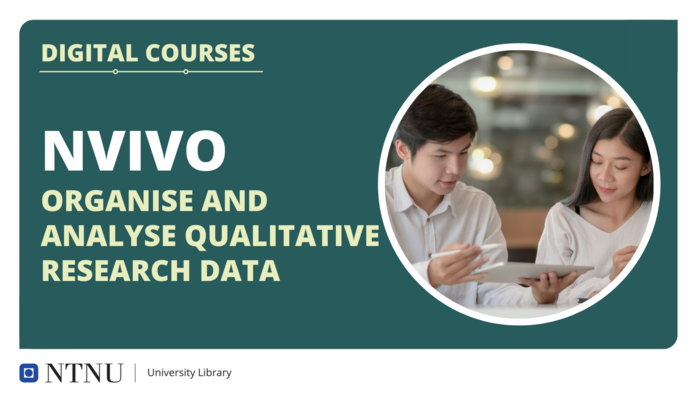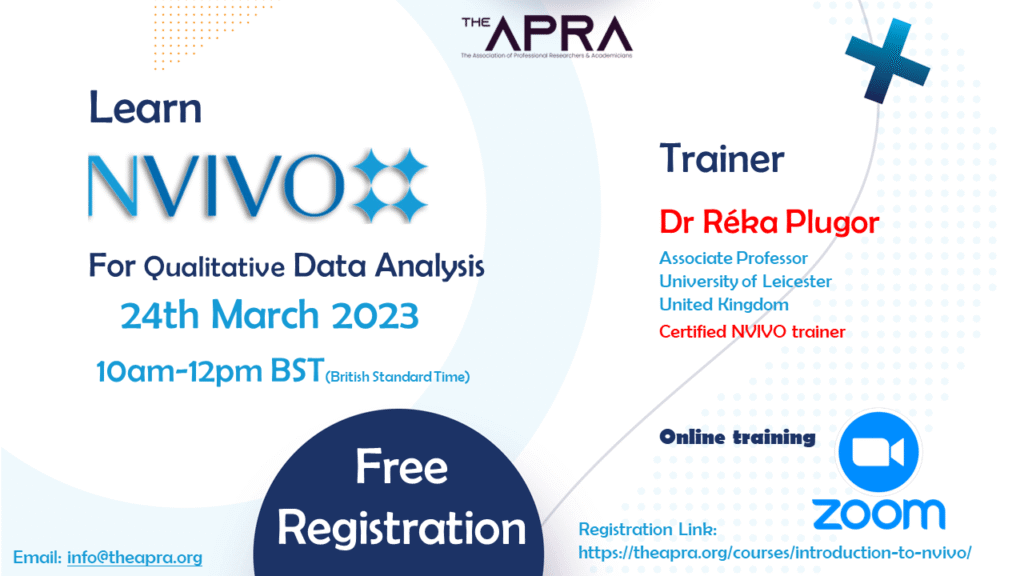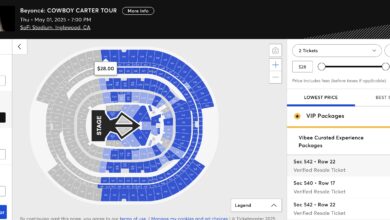NVivo Course – Comprehensive Guide for Beginners and Experts

In today’s data-driven world, qualitative research has become increasingly important across academic, social, and business sectors. NVivo Course, a leading qualitative data analysis software, has emerged as an indispensable tool for researchers, analysts, and professionals who need to organize, analyze, and interpret complex qualitative data efficiently. Whether you are conducting interviews, focus groups, surveys, or social media research, NVivo Course provides a structured and systematic approach to uncover insights that traditional methods might overlook.
Taking an NVivo course can dramatically improve your ability to work with qualitative data. These courses equip learners with both technical proficiency in the software and a deep understanding of research methodologies, coding practices, and data visualization. By mastering NVivo, students and professionals can reduce manual workloads, improve accuracy, and enhance the overall quality of their analysis.
This article provides a comprehensive guide to NVivo courses, including their benefits, types, skills gained, and how to choose the right one. Whether you are a beginner seeking foundational knowledge or an experienced researcher aiming to advance your expertise, this guide will help you understand why NVivo courses are crucial and how they can elevate your research capabilities.
What is NVivo and Why Learn It?
NVivo is a software designed to simplify and organize qualitative research. Unlike spreadsheets or manual coding methods, NVivo allows researchers to systematically code text, audio, video, and social media data. Its intuitive interface provides powerful tools to identify themes, patterns, and relationships within qualitative datasets.
One of the primary advantages of NVivo is its ability to integrate multiple data sources. Researchers can analyze survey responses, interview transcripts, field notes, and online content in one cohesive platform. This centralization enhances consistency and reliability, making it easier to track patterns, generate reports, and visualize insights. For example, NVivo’s word frequency and thematic mapping features allow researchers to identify recurring ideas and concepts quickly.
Learning NVivo is especially valuable for academic research, social sciences, marketing, and business analytics. It allows for efficient data management and supports evidence-based decision-making. By mastering NVivo, you gain the ability to conduct more sophisticated analyses, present data visually, and extract meaningful conclusions that drive insights. The software also fosters collaboration by allowing research teams to work collectively on projects, ensuring data integrity and streamlined workflow.
Ultimately, learning NVivo bridges the gap between raw data and actionable insights. It equips researchers with a structured methodology that not only saves time but also enhances the depth and quality of analysis. For anyone serious about qualitative research, NVivo is a skill worth mastering.
Types of NVivo Courses Available
NVivo courses are designed to cater to a wide range of learners, from beginners to advanced users. Beginner courses focus on software basics, including navigation, importing data, basic coding, and generating simple reports. These courses are ideal for students or professionals new to qualitative research who need to build a solid foundation.
Intermediate courses delve deeper into thematic coding, creating frameworks, and using advanced queries to identify patterns. Learners gain a stronger understanding of qualitative research methodologies and learn to integrate NVivo’s analytical tools for more complex projects. These courses often include hands-on exercises, allowing students to apply their skills to real-world datasets.
Advanced courses focus on specialized techniques such as automated coding, social network analysis, and advanced visualization features. Researchers can master workflow optimization, complex data integration, and collaborative project management. Advanced courses are particularly useful for academic researchers, consultants, and business analysts dealing with large-scale or multi-source datasets.
In addition to skill levels, courses can be online or classroom-based. Online courses provide flexibility, often including self-paced tutorials, video lectures, and interactive assignments. Classroom courses offer direct instructor guidance, real-time feedback, and networking opportunities with peers. Some courses even offer certification upon completion, which adds credibility and can enhance career prospects. Specialized courses may focus on using NVivo for particular industries, such as social science research, market research, or policy analysis.
Skills and Knowledge Gained from an NVivo Course
Enrolling in an NVivo course provides more than just technical knowledge—it enhances research methodology skills. Learners gain proficiency in data coding, thematic analysis, and pattern recognition, which are essential for interpreting qualitative data accurately. Coding is central to NVivo, allowing researchers to categorize data systematically and identify underlying trends.
NVivo courses also teach learners to manage different types of data. Whether it’s textual content, interview transcripts, video files, or social media datasets, learners acquire the ability to organize, store, and analyze information efficiently. This versatility is particularly valuable in research fields where multiple data formats are common.
Beyond data management, NVivo training emphasizes visualization and reporting. Learners can create charts, maps, and diagrams that communicate research findings effectively. These visualization skills are crucial for academic publications, business presentations, and professional reporting.
Finally, NVivo courses instill critical thinking skills. By learning to interpret and analyze data systematically, learners develop the ability to draw meaningful conclusions and make evidence-based decisions. The combination of technical proficiency and analytical capability makes NVivo training highly valuable for students, researchers, and professionals seeking to advance their careers or academic work.
How to Choose the Right NVivo Course

Selecting the right NVivo course depends on several key factors. First, assess your current skill level. Beginners should focus on foundational courses that introduce the software and basic coding, while experienced researchers may benefit from intermediate or advanced courses that explore complex analytical features.
Course format is another consideration. Online courses offer flexibility and self-paced learning, ideal for busy professionals or remote students. Classroom courses provide instructor-led training, hands-on exercises, and peer interaction, which can enhance understanding and retention. Evaluating course credibility is also essential—look for experienced instructors, well-reviewed programs, and recognized certifications.
Consider your research goals and professional needs. Some courses are tailored for academic researchers, while others target business analysts, policy researchers, or social science professionals. Specialized courses may focus on specific methodologies, like thematic analysis or social media analytics, which can be aligned with your work objectives.
Finally, check course resources and support. Quality courses provide access to practice datasets, tutorials, and post-course support. Practical exercises and real-world applications ensure that skills learned are immediately applicable. By carefully evaluating these factors, you can select a course that maximizes learning outcomes and ensures the best return on investment in both time and effort.
Career and Academic Benefits of NVivo Training
Mastering NVivo opens numerous academic and professional opportunities. For students and researchers, it streamlines qualitative data analysis, enabling more accurate and efficient research outcomes. It also enhances the quality of academic papers, dissertations, and reports, as structured data analysis is highly valued in scholarly work.
Professionals in business, marketing, and policy research also benefit. NVivo skills allow analysts to process complex data, identify trends, and support data-driven decision-making. Employers value these skills because they enhance productivity and enable more informed strategies based on qualitative insights.
Certification in NVivo further strengthens a resume or CV, signaling proficiency to academic institutions or potential employers. With growing emphasis on data analysis and research, NVivo expertise can differentiate you in competitive fields. Industries such as market research, social sciences, education, and consulting actively seek professionals with NVivo skills.
Beyond immediate career benefits, NVivo training fosters lifelong research skills. Learners develop systematic thinking, analytical rigor, and proficiency in data interpretation, which are transferable to multiple roles and research contexts. In a data-driven world, these skills are invaluable for long-term professional growth and success.
Conclusion
An NVivo course provides essential skills for anyone engaged in qualitative research. From understanding software basics to mastering advanced coding, visualization, and data interpretation, NVivo training enhances both efficiency and analytical capabilities. The course benefits extend across academic, business, and professional domains, making it a valuable investment for researchers, analysts, and students alike.
Choosing the right NVivo course ensures that learners acquire practical, applicable skills aligned with their goals. Whether for career advancement, academic research, or personal development, NVivo expertise empowers individuals to extract meaningful insights from complex qualitative data.
By enrolling in an NVivo course, you gain more than software proficiency—you gain a structured approach to research, enhanced analytical thinking, and a competitive advantage in today’s data-driven world.
FAQs About NVivo Courses
What is an NVivo course?
A training program that teaches qualitative data analysis using NVivo software, covering coding, visualization, and reporting.
Who should take an NVivo course?
Students, researchers, professionals, and anyone involved in qualitative data analysis.
How long does an NVivo course usually take?
Duration varies from a few hours for beginner workshops to several weeks for advanced certification programs.
Are NVivo courses available online?
Yes, many courses are available online, offering self-paced learning and virtual support.
What skills will I gain from an NVivo course?
Skills include data coding, thematic analysis, visualization, reporting, and research methodology.
Can beginners with no research experience take NVivo courses?
Absolutely, beginner courses are designed to build foundational knowledge from scratch.
Is NVivo certification recognized internationally?
Yes, certifications are widely recognized in academic and professional circles worldwide.
What types of data can I analyze with NVivo?
Text, audio, video, survey responses, social media content, and other qualitative datasets.
How much does an NVivo course cost?
Costs vary depending on level, duration, and delivery format, ranging from free workshops to paid certifications.
How can NVivo training benefit my career or research projects?
It improves research efficiency, accuracy, analytical skills, and enhances employability or academic credibility.
You May Also Read: Jerwood Library




